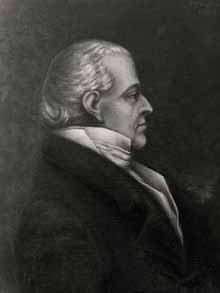 |
| Ott & Bunyie, Vegetable Seed for Sale February 26, 1814 Federal Republican Newspaper Georgetown, District of Columbia |
GARDEN SEED.
The subscriber has
just received, a General
Assortment of
FRESH GARDEN SEEDS,
AMONG WHICH ARE,
Early York CABBAGES
Battersea "
Drum- Head "
Green & Yellow Savoy, "
Early Short- Top & Salmon
RADISHES
Solid and Red CELERY
Double PARSLEY, Red BEAT
PARSNIP and CARROT Seed
White and Brown ONION
Early and Late CAULIFLOWER
VEGETABLE OYSTER
MIXED ENDIVE, LETTUCE
EARLY CUCUMBER- all of which have
been tried, and found to vegetate.
He has on hand, as usual,
a large and General
Assortment of
DRUGS, PATENT &
and OTHER FAMILY
MEDICINES
CHEMICAL PREPARATIONS
PAINTS, OILS, DIE
STUFFS,
PERFUMERY, SPICES,
HAVANA SEGARS of a
superior quality &c.
All of which he is
disposed to sell on the lowest terms. JOHN
OTT.
Chemist
and Druggist.
N.B. For the
accommodation of his friends
and the public, he
keeps his Fountains of
SODA & ROCHELLE
WATER
running during the
winter.
Georgetown, Feb. 17.
co18t
————————————————————————
GARDEN SEEDS, &c.
The
subscriber being executor on the estate
of the late Thomas Main, Gardener, near
Georgetown, has for sale at his store, opposite the post
office, Georgetown,
Beans and
Peas of different sorts
Early York
and other Cabbages,
Turnip,
Onion And a variety of other Garden seeds
Also,
at the Nursery
some thousand plants of the Pirate cancer
Hedge Thorne, a variety of Fruit Trees
Purple Each, Paper Mulberry
Catava, Chinese Arborvitae
Honey Locust, Flowering Bushes, &c.
WILLIAM
BUNYIE [sic].
February 15 - co[3]t*[1]
Transcribed by John Peter Thompson, February 26th, 2014.
Thomas Main, a gardener from Scotland, settled in the District of Columbia around 1804. His nursery may have been the earliest in the District of Columbia.
"In 1805, Thomas Jefferson ordered 4,000 thorns from the Thomas Main nursery to plant at Monticello as a live fence.Main called this particular species the "American hedge thorn" and it grew abundantly around Washington." quoted from the website - Washington Hawthorn at http://www.monticello.org/site/house-and-gardens/washington-hawthorn
Thomas Main, a gardener from Scotland, settled in the District of Columbia around 1804. His nursery may have been the earliest in the District of Columbia.
"In 1805, Thomas Jefferson ordered 4,000 thorns from the Thomas Main nursery to plant at Monticello as a live fence.Main called this particular species the "American hedge thorn" and it grew abundantly around Washington." quoted from the website - Washington Hawthorn at http://www.monticello.org/site/house-and-gardens/washington-hawthorn







